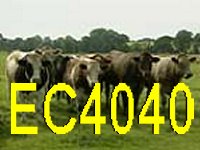 |
COURSE INFORMATION |
Welcome to Senior Sophister Economics of Food Markets on the Web!Course description Course DescriptionThis course introduces students to policy issues arising from the operation of food and agricultural markets as well as to some analytical tools which can be used to study these issues. Food and agricultural markets provide an excellent laboratory for the application of microeconomic principles because of the prevalence of market failures and government intervention. The course examines the rationale for public intervention in agricultural and food markets, explores the functioning of the EU's Common Agricultural Policy, examines the consequences of price and income support both for the domestic economy and for world food markets, and evaluates the attempts to regulate agricultural policy interventions through rule-making by the World Trade Organisation. Additional topics include agricultural policy and the environment, market power in the food chain, and the economics of food safety. The course should appeal to students with an interest in European economics, public policy analysis, international trade or development issues. Course objectivesThe course aims to give students a thorough understanding of current controversies surrounding agricultural and food policy. The emphasis is on applying an economic perspective to these issues. A second objective of the course is to introduce students to some tools of public policy analysis, particularly applied welfare analysis. A third objective of the course is to show students how to apply the theory in practice to empirical estimation of policy effects. To this end, project work will encourage students to develop small spreadsheet models to investigate particular policy issues. Fourth, students will be asked to make class presentations to improve presentation skills. Course prerequisitesThe course uses standard graphical analysis of markets which will have been covered in the Freshman economics courses. Many students will probably have had some exposure to EU agricultural policy either in the SF Economy of Ireland course or the JS European Economy course. This will be a helpful foundation but sufficient references are provided to make sure that other students can quickly catch up. Course assessmentsThe overall grade for the course is based on the end-of-year examination (80%) plus two essays/pieces of project work to be handed in during the year (20%). The examination paper will consist of eight questions drawn from the ten topics covered in the course outline. Links to previous examination papers are provided on the course website. Further details of the essays/project work will be given at the appropriate time in lectures and on the course website. Please note that I operate a policy of zero tolerance for late assignment submissions. Late essays/projects will be awarded a mark which is one grade (i.e. 10 percentage points) below the mark which would otherwise be awarded. Medical certificates for late submission must have a clear relevance to the explanation for any delay. Socrates students should see me if they need special assessment arrangements. Course readingThe course is pitched at a Senior Sophister level and assumes that students will engage in independent reading around the topics listed. Students are not expected to become equally competent in each area, and there will be considerable choice on the end of year examination. The reading list contains only a short introductory set of readings on each topic. Each lecture will be associated with a Web page with suggestions for additional readings, resources etc. These suggested readings should be taken as a starting point and students are encouraged to follow-up on these readings using the resources of the library. Administrative arrangementsThe course this year is jointly taught by Dr Mary Keeney and Professor Alan Matthews Lectures: Mondays 11-1 Room 3141A Arts Building Previous examination papersThese can be found by searching the Trinity College Examinations
On-Line website. However, please note that the course material is revised annually and the topics covered in the examination may change. |
|